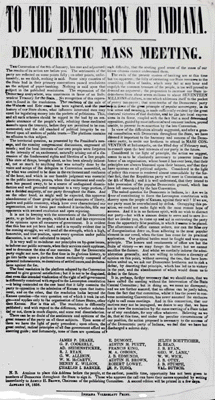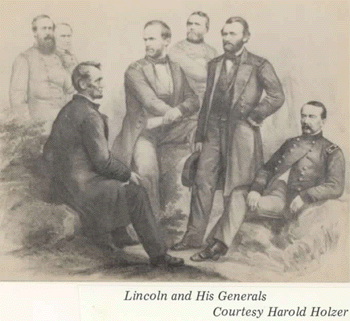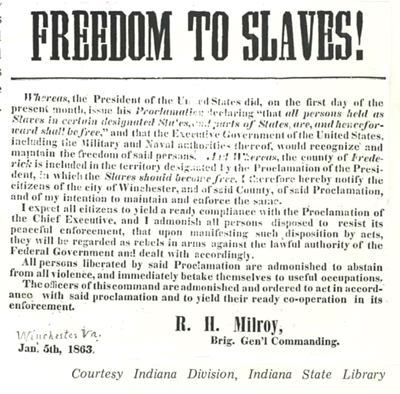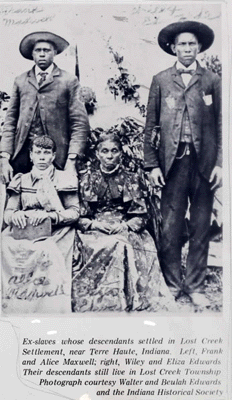Lincoln, the Emancipation Proclamation, and Freedom

Courtesy Indiana Division, Indiana State Library
The sectional crisis, precipitated in large measure by the controversy over the "peculiar institution," culminated in late 1859 and 1860 with two epochal events: John Brown's raid on the federal arsenal at Harpers Ferry and Abraham Lincoln's nomination and election as president.
Brown and his small, racially integrated band of men stormed the arsenal in mid-October, 1859, with the hope of securing arms and sparking a revolt by Virginia slaves. The ill-fated, almost suicidal raid was quickly put down, and Brown and several of his company were executed. In spite of the failure of his attempt, Brown's death served his cause well; abolitionists viewed him as a martyr, and as a new symbol for the movement.1
This was not everyone's view, however. "You asked me . . . ," James W. Messier, Clinton County, Indiana, wrote his brother, "what I thought about the hanging of John Brown. I think it was just and necessary." Though Messier did not defend slavery, he thought that as long as it was legal in the United States it must be "put up with." Moreover, although Brown meant well, "he could not accomplish a little good without a great deal of harm." "I can not but think Brown was slightly deranged," wrote Messier, "but still I think he deserved hanging as he had been the cause of several lives being taken and if he had been spared perhaps he would have done more harm." Also, it was necessary "that there should be an example to deter others from doing the same.”2
In November, 1860, Abraham Lincoln was elected president. The nation, and some families, had completely divided over the slavery issue. Other families tried to keep themselves intact. "It would be extremely foolish," a Kentucky slaveholder, Thomas Campbell, wrote his brother in Indiana, "for you and I, brothers, to fall out about politics. . . . The question and the only practical question open for discussion is, Slavery being engrafted, by our forefathers upon this generation, how are we to get rid of it.''3

Lincoln and His Generals
Courtesy Harold Holzer
The unity of the nation could not be preserved, however. South Carolina seceded from the union in December, followed by several other states in January; the Confederate States of America was formally organized on February 4, 1861. Some southerners, however, lamented what appeared to be imminent war between the states. "The result," Campbell had predicted, "will be that there will be an interminable civil war, and innocent white blood will be shed until the stream separating the two nationalities will run red, all for the Nigger. More white men and women and children will be killed than there are negroes free and slaves in the entire country."4
"That on the first day of January, in the year of our Lord one thousand, eight hundred and sixty-three, all persons held as slaves within any State or designated part of a State, the people whereof shall then be in rebellion against the United States, shall be then, thenceforward, and forever free; and the Executive Government of the United States, including the military and naval authority thereof, will recognize and maintain the freedom of such persons, and will do no act or acts to repress such persons, or any of them, in any efforts they may make for their actual freedom.
"That the Executive will, on the first day of January aforesaid, by proclamation, designate the States and parts of States, if any, in which the people thereof, respectively, shall then be in rebellion against the United States; and the fact that any State or the people thereof, shall on that day be, in good faith, represented in the Congress of the United States by members chosen thereto at elections wherein a majority of the qualified voters of such State shall have participated, shall, in the absence of strong contervailing testimony, be deemed conclusive evidence that such State, and the people thereof, are not then in rebellion against the United States".Part of the Preliminary Emancipation Proclamation, Issued September 22, 1862
When Lincoln assumed office, he adopted measures to placate the South and avoid, if possible, civil war. In his inaugural address on March 4, 1861, the president unequivocally stated his position. He had no inclination, he told the nation, "to interfere with the institution of slavery in the States where it exists.''5 The South would not be pacified. By 1861 the abolitionists' drive for emancipation had nearly isolated the southern states. One month after Lincoln's address, Confederates fired on the federal post at Fort Sumter, South Carolina, initiating the Civil War. Lincoln never acknowledged the South's right to secede from the Union, and at first he did not acknowledge slavery as a war issue. The war, in Lincoln's estimation, was simply to save the Union. He believed the Confederacy had pursued illegal measures and was at war with the government of the United States. Officially, the conflict was called the War of the Rebellion.
Most northerners speedily joined Union forces. Some Hoosiers, however, sympathized with the South. After Union General Benjamin Butler allowed blacks, whom he called "contraband," to enter his camp in the South, some Indiana citizens vented their ire against Negroes. A poem which appeared in an Indianapolis newspaper carried the message:
Be that phrase forever nameless
Negro contraband, most shameless
Get thee back into the rice fields,
And the cotton-blooming shore.
See our country for thee bleeding—
Cease to prate of rights or freedom
Dost-not know thou wert born a heathen,
Quit the bust above the door,
Niggers have no rights as humans,
So be gone from off the door.
Quoth the darkey "nevermore.''6
Abolitionists, appalled at "Negro-hating" statements such as this, called on the president to make slavery a war issue. "I pray," wrote Sarah Grimke, a zealous abolitionist, "that victory may not crown our arms until we have the nobility to say that this war is a war of abolition.''7 But northerners, including many Hoosiers, were not willing to admit that slavery had anything to do with the war. "[A]bout this war being to free the Negroes," George Edwards, a Hoosier volunteer argued, "it. . . is all afudge.''8
In April, 1862, the United States entered into a treaty with Great Britain concerning the slave trade. Under the provisions of the treaty, Negroes found on slave ships were to be set free.9 During the same month Congress used its power to abolish slavery in the nation's capital and in the territories. Southerners viewed congressional actions, along with those of abolitionists, as increasingly "radical." "But for the interference of the fanatical and indescreet [sic] portion of the North," Thomas Campbell claimed, "[colonization] would now be in active operation in the state of Kentucky. . . . But for the interference of Northern newspapers and fanatics, in what we considered our domestic affairs the anti-slavery sentiment of Kentucky would have prevailed.”10 Yet when another opportunity arose for states such as Kentucky to display their anti-slavery sentiment, they still failed to do so.
An ex-slave, Josiah Henson, had astutely pointed out that the South would never willingly give up slavery. "It is a mistaken idea," he wrote, "that the majority of the slaveholders would have sold their slaves if the government had offered to buy them. They liked the system, had grown up with it, and were not disposed to part with it without a struggle.''11 As Lincoln sought solutions for resolving the war, however, he proposed compensated emancipation. Under Lincoln's plan of gradual emancipation with compensation, all slaves in the United States would have been free by the year 1900. In July, 1862, he offered the border states of Kentucky, Maryland, Delaware, and Missouri the value of their slaves if they would set them free. No state, however, took advantage of the government's offer for reimbursement.12
During the summer of 1862, seeking a measure to force the Confederates back into the Union, Lincoln threatened to emancipate the slaves in rebellious states. In July he called his cabinet together and read them a draft of a proclamation for emancipation. Ever the astute politician, Lincoln sensed that the time had not yet come for such a step. By late summer abolitionists and blacks were anxiously anticipating the president's announcement, and Horace Greeley, editor of the New York Tribune, asked the president what his intentions were. Lincoln answered Greeley's inquiry in eloquent but equivocal language: "My paramount object in this struggle is to save the Union, and is not either to save or to destroy slavery, if I could save the Union without freeing any slave I would do it, and if I could save it by freeing all the slaves I would do it; and if I could save it by freeing some and leaving others alone I would also do that. What I do about slavery, and the colored race, I do because I believe it helps to save the Union.''13
The president announced his ultimatum to the South in September, 1862. In his Preliminary Emancipation Proclamation Lincoln ordered that on January 1, 1863, "all persons held as slaves within any state, or designated part of a state, the people whereof shall then be in rebellion against the United States shall be then, thenceforward, and forever free." If, however, the Confederate states elected and sent members to Congress, it would "be deemed conclusive evidence that such state and the people thereof, are not then in rebellion against the United States." Thus, if the Confederate states returned to the Union, slavery in those states would remain intact.14
In December, 1862, Lincoln gave both the border states, which had remained loyal, and the Confederacy one last chance. In his address to Congress he suggested a constitutional amendment under which states abolishing slavery before January 1, 1900, would be compensated. Lincoln finally came to the conclusion that "Without slavery the rebellion could never have existed; without slavery it could not continue." He also observed that the United States was a country made for one race of people, but "not well adapted for two or more," and proposed colonization of blacks to South America or Africa. 15
Lincoln's Announcement of the prospective emancipation and his stance on colonization engendered various emotions. Some persons bitterly opposed emancipation. Stephen Miller, a wounded soldier from Indiana, was recuperating in Louisville and wrote home to express his displeasure with the proclamation: "As soon as i get my money i am coming home I dont care if the[y] call it deserting or not. . . . I did not volenteer [sic] to fight to free the niggers and i guess that[s] what that old black Abolition Abe is at now[.] if he dont go at trying to free the niggers i will come back in to the service again but if he goes at that i shall never shoulder a gun again to fight the rebels.''16

Courtesy Indiana Division, Indiana State Library
Some, who viewed themselves as "loyal men," believed in protecting the loyal slaveholders in the South; others favored freeing slaves and colonizing them. Still others remembered that earlier General John Fremont had issued a proclamation freeing slaves of Confederates in Missouri. Lincoln, however, had denounced Fremont's unauthorized actions, reprimanded him, and declared the proclamation null and void. Now, some Hoosiers claimed, Fremont's "proclamation gave inner satisfaction to Loyal men--whilst the policy of Lincoln and his Cabinet has been condemned.''17 Moreover, some Hoosiers believed it was an outright mistake to issue a proclamation. "Let it alone," one Hoosier claimed, and "loyal masters" will "soon rid themselves of the curse, not curse to the negro but to the white man. . . . [I] f they adopt measures to get rid of it gradually in 50 or 100 years it will be soon enough for the welfare of the negro, if immediate & total emancipation of all slaves was to take place . . . I should look on it as the total Destruction of the African Race in this Country.''18
The proclamation, contrary to the common assumption today, did not free every slave; they would be free only in states that were in rebellion against the authority of the federal government. Therefore, slaves in Kentucky, Delaware, Maryland, Missouri, Tennessee, and parts of Virginia and Louisiana remained in slavery. Two months after the Emancipation Proclamation, slaves were at a premium price in Kentucky, as they likely were in the other loyal states. "There may be gone blockheads of the north," Indiana soldier Andrew McGarrah wrote home, "who think this is an abolition war." But, in Kentucky, slavery went on as it did before the proclamation. "Lincoln's proclamation is nullified," McGarrah wrote. "Slaves are worth more here now than they have been heretofore. They sell very high. The citizens here are not uneasy about their Blacks.”19
Amendment XIII
Neither slavery nor involuntary servitude, except as punishment for crime whereof the party shall have been duly convicted, shall exist within the United States, or any place subject to their jurisdiction.
United States Constitution
Blacks were offended that Lincoln failed to free all the slaves, and many, including Sojourner Truth, insisted that more should be done. "I come from another field--the country of a slave. They have got their liberty--so much good luck to have slavery partly destroyed; not entirely. I want it root and branch destroyed. Then we will all be free indeed.''20 For abolitionists, however, the proclamation represented a start. Lincoln also had empowered the military to carry out emancipation. "We, having really stepped forward," one abolitionist soldier wrote, "as champions in arms for universal freedom & eternal right, will battle far more gloriously and sucessfully [sic].”21 Slaves eagerly awaited the news of freedom. An indication of what they felt is contained in the story of an African-born slave called Nicodemus. Whether legend or fact, the story is revealing. Reportedly, Nicodemus told his friends Elijah and Pomp, just before he died, to "wake him up for the great Jubilee." When news of the proclamation came, a powerful song was sung:
The good time coming is almost here
It was long, long, long on the way,
So run and tell Elijah to hurry up Pomp
And meet us at the gumtree down in the swamp
To wake Nicodemus today.22
The proclamation was a bittersweet victory for most free blacks. Frederick Douglass' comments undoubtedly summarized the feelings of many. "It was not a proclamation of 'liberty throughout all the land, unto all the inhabitants thereof,' such as we had hoped it would be, but was one marked by discriminations and reservations. Its operation was confined within certain geographical and military lines. It only abolished slavery where it did not exist, and left it intact where it did exist. It was a measure apparently inspired by the low motive of military necessity, and by so far as it was so, it would become inoperative and useless when military necessity should cease. There was much said in this line, and much that was narrow and erroneous. For my own part, I took the proclamation, first and last, for a little more than it purported, and saw in its spirit a life and power far beyond its letter.''23
Some Hoosiers blamed abolitionists for the turn of events. "[D] amned Abolition Politicians of the North," wrote Hoosier soldier Samuel Shepardson, "have ruined the President, They have ruined the South, They have ruined the Government, They have ruined Themselves and They are now trying to ruin what yet remains of the North.''24 Indeed, after the Emancipation Proclamation both Congress and abolitionists changed the course of events. Congress in January, 1865, with a majority of congressmen of an antislavery persuasion, adopted measures far more "radical" than the proclamation. Immediate abolitionists refused to wait until 1900 to secure universal emancipation. They began a petition campaign which resulted in adoption of the Thirteenth Amendment to the United States Constitution. The amendment, ratified in December, 1865, read: "Neither slavery nor involuntary servitude, except as punishment for crime whereof the party shall have been duly convicted, shall exist within the United States, or any place subject to their jurisdiction." The Fourteenth and Fifteenth amendments followed (the former ratified in 1868, the latter in 1870), securing citizenship and voting rights for the former bondsmen.
These so-called Civil War amendments marked the culmination of the lengthy, often tumultuous abolitionist movement. It would take many years for the promises implicit in these amendments to be realized; indeed, the struggle for civil rights for all Americans has been a continuing one. But the amendments provided two ingredients necessary for further successes: hope for the future and a firm constitutional foundation. Although the abolitionists' immediate goal was realized when the Emancipation Proclamation and the Thirteenth Amendment eliminated the "peculiar institution" of chattel slavery from American society, the wheels their crusade set in motion continue to turn.

Ex-slaves whose descendants settled in Lost Creek Settlement, near Terre Haute, Indiana.
Left, Frank and Alice Maxwell; right, Wiley and Eliza Edwards.
Their descendants still live in Lost Creek Township.
Photograph courtesy Walter and Beulah Edwards and the Indiana Historical Society
Bury Me in a Free Land
Make me a grave where 'er you will,
In a lowly plain, or a lofty hill,
Make it among earth's humblest graves,
But not in a land where men are slaves.
I could not rest if around my grave
I heard the steps of a trembling slave:
His shadow above my silent tomb
Would make it a place of fearful gloom.
……………………………………………………..
I would sleep, dear friends, where bloated might
Can rob no man of his dearest right;
My rest shall be calm in any grave
Where none can call his brother a slave.
I ask no monument, proud and high,
To arrest the gaze of the passers by;
All that my yearning spirit craves,
Is bury me not in a land of'slaves.
Frances Ellen Watkins Harper 1825-1911From An Anthology of Verse By American Negroes, 1968
